For Immediate Release: August 12, 2024, 10:00 a.m. U.S. Eastern Time
Media Contact: Kara Flynn, (202) 257-8424, press@ashg.org
The American Society of Human Genetics (ASHG) congratulates and welcomes the 2024-2026 Human Genetics Scholars. This is an outstanding group of trainees and early career researchers who are recognized for their research accomplishments as well as their commitment to fostering diversity, equity, and inclusion in human genetics and genomics.
The Human Genetics Scholars Initiative, launched in 2019, is made possible with the generous support from the National Human Genome Research Institute (NHGRI), Biogen, GlaxoSmithKline (GSK), Merck & Co, and Roche. Our eight new scholars join a vibrant community that offers mentorship, professional development, and the opportunity to engage with leaders across the Society and human genetics and genomics field.
Meet the 2024-2026 Human Genetic Scholars:
Amber M. Abram, MS, MPH, University of Michigan
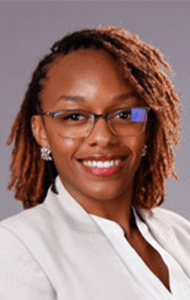
Amber M. Abram is a master’s degree student in the Genetic Counseling and Public Health programs at the University of Michigan in Ann Arbor, Mich. Her research project investigates genetic counselors’ ability to provide comprehensive and equitable care to incarcerated patients. Amber hopes to use this work to improve health outcomes for incarcerated patient populations, who are statistically more likely to come from racially minoritized and medically underserved communities and spark further conversations regarding incarcerated patient care. Prior to her graduate education, Amber earned her Bachelor of Science in Biology with an Applied Genetics concentration and Leadership minor from the University of Detroit Mercy in Detroit, Mich. where she was presented with the Vivere ex Missione Award for her commitment to servant leadership within the Detroit community. Amber is a dedicated advocate and hopes to use her training and experiences to influence positive change for racially minoritized communities and academic trainees.
Kynon J. Benjamin, PhD, Lieber Institute for Brain Development
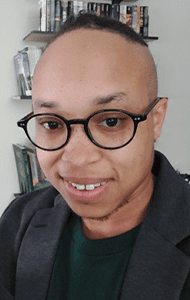
Kynon Jade Benjamin earned his GED before attending Indiana University–Purdue University Indianapolis in Indianapolis for a Bachelor of Science in Biomedical/Medical Engineering. His predoctoral studies focused on designing drug delivery and drug development assays, as well as developing bioinformatic pipelines for Angelman syndrome – a neurodevelopmental disorder. He received a PhD in Neurodevelopmental Disorders from Texas A&M University in College Station, Texas. In his postdoctoral fellowship at the Lieber Institute for Brain Development and Johns Hopkins School of Medicine in Baltimore, he developed computational pipelines for large-scale transcriptional (bulk and single-cell), genetic, and functional analyses in postmortem brain and brain organoids. Dr. Benjamin’s research career highlights the critical need for diversity and inclusive spaces. He actively mentors and advocates for underrepresented minorities.
Razaq Durodoye, BS, Case Western Reserve University
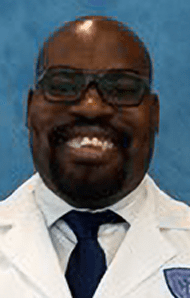
Razaq Durodoye received his Bachelor of Science in Biochemistry from the University of Texas at Dallas in Richardson, Texas and matriculated to the MD/PhD program in 2019 at Case Western Reserve University in Cleveland. He completed his pre-clerkship training in 2021 and is in his fourth year of the graduate phase in the Epidemiology and Biostatistics PhD program. His research working with Dr. Scott Williams focuses on understanding Alzheimer’s disease and other chronic conditions where he hopes to understand, address, and minimize health disparities, especially in minoritized populations.
Tania Fabo, BS, MSc, Stanford University

Tania Fabo is an MD/PhD student at Stanford University in Stanford, Calif., where she is pursuing her PhD in Genetics. She received her undergraduate degree in Human Developmental and Regenerative Biology from Harvard University in Cambridge, Mass. Earlier in 2018, she pursued two separate master’s degrees at the University of Oxford in the United Kingdom as a Rhodes Scholar—first a Master of Science degree in Medical Anthropology, followed by a Master of Science degree by Research in Oncology. Her current PhD work explores diet-mediated gene-by-environment interactions in colorectal cancer, using a combination of high-throughput functional genomics tools and population-based studies. Fabo’s ultimate goal is to become a professor who leads a lab exploring mechanistic biology and disease genetics and pathophysiology through a social and environmental lens. She is committed to advancing diversity and equity in science and medicine and wants to dedicate her career to helping minorities and those otherwise marginalized by society achieve their full potential.
Gabrielle Ferra, BS, University of Washington

Gabrielle Ferra is a PhD candidate in the Genome Sciences department at the University of Washington in Seattle, working in the labs of Drs. Kelley Harris and Maitreya Dunham. She completed her Bachelor of Applied Science in Applied Mathematics-Biology from Brown University in Providence, R.I. in 2020. At the University of Washington, she is conducting a deep mutational scan of the pharmacogene CYP2D6, which is responsible for the metabolism of approximately 25 percent of common drugs. Her research is driven by a keen interest in pharmacogenetics and precision medicine, aiming to improve healthcare outcomes for all.
JP Flores, BA, University of North Carolina at Chapel Hill
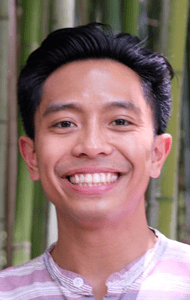
JP Flores is a PhD Candidate in Bioinformatics & Computational Biology at University of North Carolina (UNC) at Chapel Hill in Chapel Hill, N.C. studying the role of 3D chromatin structure in response to environmental stress. He is the founder and host of the podcast titled “From where does it STEM?” in which he interviews scientists about their research and career trajectory. He was a Science Policy Intern in the National Institutes of Health (NIH) Office of Science Policy housed in the NIH Director’s Office in Bethesda, Md. in 2024 and is complementing his PhD at UNC by pursuing a Graduate Certificate in Innovation for the Public Good. Through this training, he hopes to innovate in both science and social justice efforts. He is a fellow within the National Science Foundation Graduate Research Fellowship Program.
Renee’ Fonseca, MS, University of Chicago
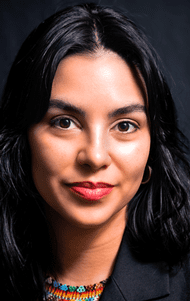
Renée Fonseca is a PhD candidate in the Department of Human Genetics at the University of Chicago in Chicago, Il., supported by a Ford Predoctoral Fellowship. Her research focuses on developing novel methods to improve polygenic score portability across populations to improve equity in disease risk prediction. Prior to attending the University of Chicago, she was a Fulbright research grantee at the Universidad del Valle in Cali, Colombia, where she characterized disease burden in an Afro-Colombian population as part of a community-driven study. She holds a Master of Science in Bioinformatics and Computational Biology from the University of South Florida in Tampa, Fl., an Artium Baccalaureus in Biology from Rollins College in Winter Park, Fl., and she is a certified Emergency Medical Technician. Long-term, she aims to build a research career leveraging genomics to advance health equity.
Esteban Vazquez-Hidalgo, PhD, Case Western Reserve University
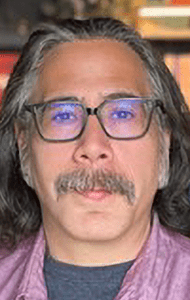
Esteban Vazquez-Hidalgo is a Postdoctoral Scholar at Case Western Reserve University’s School of Medicine in Cleveland, Ohio, where he uses his multidisciplinary training in mathematical modeling, computational biology, genomics to study genetic variation impact on allele specific expression. Dr. Vazquez-Hidalgo earned his PhD in Computational Science from San Diego State University’s joint doctoral program with Claremont Graduate University. His dissertation had two aims: The first focused on the development of mathematical and biophysical models to predict cardiac calcium concentrations. The second focused on the creation of a micro-scale biomechanical model that predicted how epithelial cells migrate by generating traction forces on their micro-environments. In addition to research, Esteban is an advocate for mentoring underrepresented students and developing strategies to support scientists of diverse backgrounds.
* * *
About the American Society of Human Genetics (ASHG)
Founded in 1948, the American Society of Human Genetics is the primary professional membership organization for human genetics specialists worldwide. Its community of nearly 8,000 members include researchers, academicians, clinicians, laboratory practice professionals, genetic counselors, nurses, and others with an interest in human genetics. The Society serves scientists, health professionals, and the public by providing forums to: (1) share research results through the ASHG Annual Meeting and in The American Journal of Human Genetics and Human Genetics and Genomics Advances; (2) advance genetic research by advocating for research support; (3) educate current and future genetics professionals, health care providers, advocates, policymakers, educators, students, and the public about all aspects of human genetics; and (4) promote genetic services and support responsible social and scientific policies. For more information, visit: http://www.ashg.org.
6120 Executive Blvd, Suite 500 | Rockville, MD 20852 | 301.634.7300 | society@ashg.org | www.ashg.org
Connect with ASHG on Twitter (@GeneticsSociety) | Facebook | LinkedIn
